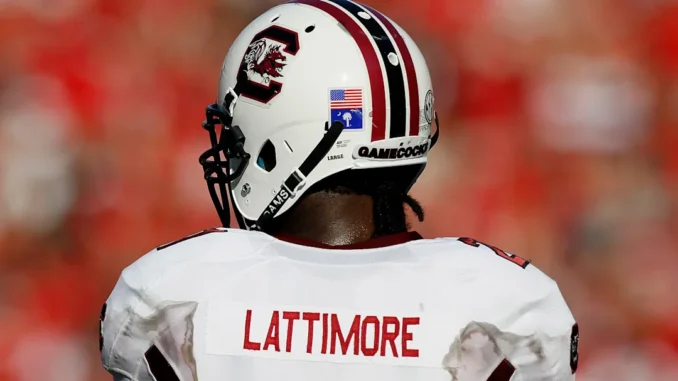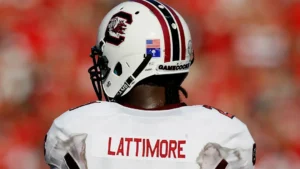
On October 27, 2012, during a game against the Tennessee Volunteers, South Carolina’s star running back, Marcus Lattimore, suffered a catastrophic knee injury that left a lasting impression on college football fans across the nation. The image of Lattimore lying on the field, his leg gruesomely injured, remains etched in the memories of many, evoking deep sorrow.
I remember that day vividly. Sitting on the couch next to my then-husband, we were completely absorbed in the South Carolina vs. Tennessee game. The play unfolded: the snap, Lattimore’s determined run, the collision with defenders, and then… his leg, horrifically twisted in the air. I screamed as my husband jumped to his feet, hands covering his mouth in disbelief. Then, silence. The stadium fell into a hushed stillness. Players from both teams knelt in solidarity, and fans stood in stunned silence, trying to process the severity of the moment. The emotional intensity was overwhelming, with tears streaming from teammates, opponents, and spectators alike.
For many, the memory of where they were when Lattimore was injured remains vivid. It serves as a stark reminder of the fragility of the sport and the deep bonds between athletes and their fans. Lattimore’s resilience and grace in the face of such adversity continue to inspire, highlighting the profound impact he has had on the South Carolina community and beyond. In a recent episode of the “Glory Daze” podcast, former NFL quarterback Johnny Manziel had an in-depth conversation with South Carolina football legend Marcus Lattimore. They discussed Lattimore’s career, the challenges he faced due to injuries, and his life after football. Lattimore shared his decision to commit to the University of South Carolina, crediting then-head coach Steve Spurrier and the supportive community that made him feel at home. He spoke about the pride and responsibility he felt representing his home state on a national stage. As one of the most highly touted recruits in South Carolina’s history, Lattimore made an immediate impact, earning national recognition and solidifying his status as a key player. His dedication and performance were crucial in elevating the team’s prominence during his time as a Gamecock.
**Memorable Moments:**
Reflecting on his time with the Gamecocks, Lattimore recalled significant games and achievements, including:
– **Historic Victory:** He shared memories of South Carolina’s first-ever win over a No. 1 ranked team, Alabama, in 2010, where he played a pivotal role.
– **Personal Milestones:** Lattimore spoke about setting the school record for touchdowns and the camaraderie with teammates that contributed to their success.
**Career-Altering Injuries:**
Lattimore recounted the severe knee injuries he sustained during his time at the University of South Carolina, which drastically altered his promising football career. He spoke openly about the physical and emotional toll these injuries took on him, as well as the grueling rehabilitation process he endured in hopes of returning to the field.
**Transitioning Beyond Football:**
The conversation also touched on Lattimore’s life after football, focusing on his efforts to redefine his identity and purpose beyond being an athlete. He shared insights into his work mentoring young athletes, emphasizing the importance of mental health and resilience. Lattimore also discussed his initiatives aimed at preparing athletes for life after sports, ensuring they have the tools and support needed to navigate post-athletic careers.
**Shared Experiences with Manziel:**
Both Lattimore and Manziel reflected on the pressures and expectations that come with being high-profile college athletes. They discussed the challenges of dealing with public scrutiny, the impact of injuries on their careers, and the mental health struggles that often accompany such experiences. Their dialogue provided a nuanced perspective on the highs and lows of collegiate athletics and the importance of support systems in an athlete’s life.
**Legacy and Influence:**
Beyond his athletic achievements, Lattimore’s character and humility left a lasting impression. His decision to stay close to home for college and his engagement with fans and the broader community highlighted his genuine nature. Even after his playing days, his involvement in mentoring and supporting young athletes underscored his dedication to giving back. In the interview, Lattimore highlighted his work in mentoring programs and his role in supporting young players navigating the pressures of collegiate athletics.
In essence, Marcus Lattimore’s legacy at South Carolina transcends his on-field accomplishments. His combination of talent, resilience, and character has left an indelible mark, making him one of the most beloved figures in the university’s history. This conversation between two football icons offers profound insights into the resilience and adaptability athletes must possess when facing unexpected challenges, while also underscoring the critical importance of mental health awareness in sports.
Leave a Reply